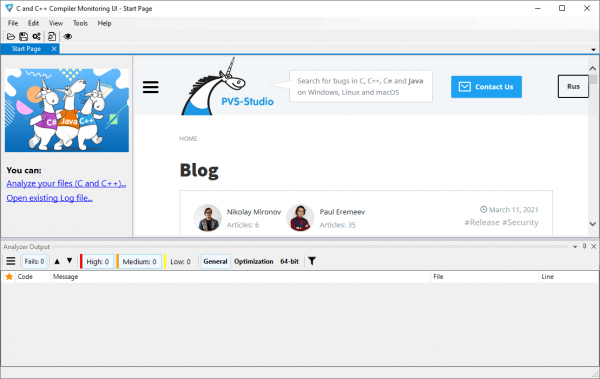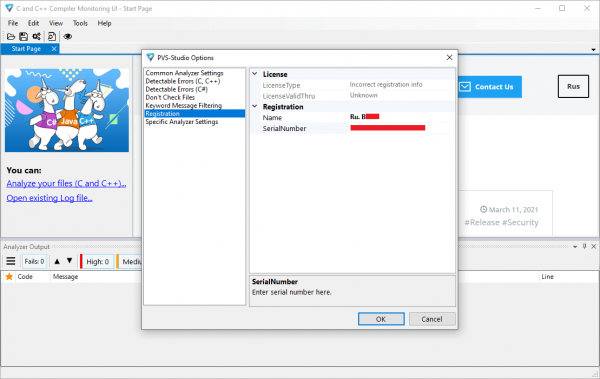Overview of PVS-Studio 7.40.101452.2093:
 PVS-Studio 7.40.101452.2093 Crack performs static code analysis and generates reports that help programmers find and fix bugs. PVS-Studio performs a variety of code checks, and it is also useful for finding typos and copy-and-paste errors. Examples of such errors are V501, V517, V522, V523, and V3001.
PVS-Studio 7.40.101452.2093 Crack performs static code analysis and generates reports that help programmers find and fix bugs. PVS-Studio performs a variety of code checks, and it is also useful for finding typos and copy-and-paste errors. Examples of such errors are V501, V517, V522, V523, and V3001.
PVS-Studio 7.40.101452.2093 Patch is a tool for detecting bugs and security vulnerabilities in the source code of programs, which are written in C, C++, C #, and Java. The analyzer can run overnight on the server and warn of suspicious code snippets. Ideally, these errors can be detected and corrected before they reach the repository. PVS-Studio Full Version can be started automatically immediately after the compiler for newly modified files.
PVS-Studio 7.40.101452.2093 License Key can be integrated into the Visual Studio development environment. If you use this IDE, you will probably have to go to the PVS-Studio plugins menu and select “Check current projects”. However, this is often a more complicated process, so you will need to integrate PVS-Studio into an exotic building system. The subject of such integration is too broad to be explained here. You can find all the relevant information in our detailed documentation.
You may also like WYSIWYG Web Builder + Crack
PVS-Studio 7.40.101452.2093 Key Features:
- Simple and seamless integration with Visual Studio 2010-2019.
- Automatically scan individual files after they are recompiled.
- An online reference guide to all diagnostics available in the program, on the website, and in the documentation (presented as a .pdf file). Up to 550 pages of documentation.
- Storage and load analysis results allow overnight checks – at night, the analyzer performs the analysis and gives you the results in the morning.
- You can save scan results in HTML format with full source code navigation.
- The project analysis is executed from the command line. which helps to integrate PVS-Studio into the night development; new newspapers will be issued in the morning.
- High scalability: Support for multi-core and multi-processor systems with the ability to specify the number of cores to use; IncrediBuild support.
- Interactive filtering of analysis results (log files) in the PVS-Studio window: by diagnostic number, file name, and keyword in the diagnostic test.
- PVS-Studio 7.40.101452.2093 Keygen automatically checks for updates (while working on the IDE and building overnight).
- The BlameNotifier utility. This tool allows you to send email notifications to developers about bugs detected by PVS-Studio while running at night.
Supported languages and compilers:
- The Windows. Visual Studio 2010-2017 C, C ++, C ++ / CLI, C ++ / CX (WinRT), C #
- Windows IAR Embedded Workbench, C / C/C++ compiler for ARM C, C++
- Windows Keil µVision, DS-MDK, ARM 5/6 C compiler, C++
- Windows, Texas Instruments Code Composer Studio, ARM C, C++ code generation tools
- Windows toolchain, GNU Arm Embedded, GCC Arm Embedded compiler, C, C++
- Windows Clang C, C++
- Windows MinGW C, C++
- Windows Java
How does PVS-Studio 7.40.101452.2093 Work?
- The abstract syntax tree-based model-based analysis looks for fragments in the source code that are similar to known code models with errors.
- Method annotations provide more information about the method used than those obtained by scanning only signatures.
- Data flow analysis (data-flow analysis) is used to evaluate the limits placed on the values of variables when processing various language constructs. For example, analyzing the flow of data makes it possible to evaluate the value that a variable can take in a block if / else.
- The program’s semantic model-based inference type provides the parser with complete information about all variables and instructions in the code.
- Symbolic execution evaluates the value of a variable that could be causing an error by performing a range check.
- Polluted data analysis (polluted data analysis) detects cases where the application uses unverified user data. Too much trust in this data can lead to vulnerabilities (e.g., SQLI, XSS, traverse paths).
What’s new in PVS-Studio 7.40?
(Released on 10-12-2025)
- PVS-Studio plugin is now available for Visual Studio 2026.
- PVS-Studio plugin is now available for Qt Creator 18.x. The plugin for Qt Creator 13.x is no longer supported. We aim to maintain backward compatibility by supporting the latest plugin versions for all Qt Creator versions within two years of each release.
- PVS-Studio C# analyzer now supports projects for .NET 10. On Windows, the minimum .NET version for analyzing SDK-style projects remains .NET 9. On Linux, C# project analysis now requires .NET 10.
- The first 100 diagnostic rules for C# were revised to incorporate analyzer improvements introduced since their initial release, as well as to cover new language constructs.
- The documentation section on using PVS-Studio for Unreal Engine projects was updated to include instructions for using the analyzer in the Unreal Build Accelerator distributed build system.
- The percentage coverage by standard version and rule category was added to the PVS-Studio warning classification page for MISRA C and MISRA C++.
- Capabilities of .pvsconfig configuration files were refined. The analyzer now correctly resolves relative paths for the V_EXCLUDE_PATH and V_ANALYSIS_PATHS options.
- The handling of template functions was enhanced in the new C and C++ parser introduced in release 7.38. If the new parser exhibits stability issues, it is recommended to temporarily switch back to the previous implementation via the //V_USE_OLD_PARSER option and to report the issue to our technical support team. Such feedback helps enhance the parser’s stability and reliability.
- Improvements were made to taint analysis for Java: it now supports ternary operators and incorporates interprocedural context when traversing fields.
- The cross-platform C and C++ analyzer now supports the sccache incremental build tool. For more details on this update, please consult the documentation.
- The issue related to PVS-Studio integration with Compiler Explorer was resolved. For more details on how to use the integration, please consult this page.
- [Breaking change] The keys used to install PVS-Studio analyzer from .deb and .rpm repositories were updated. Reinstallation of the keys may be required, please refer to the documentation for instructions.
- [Breaking change] The .NET 10 SDK is now required to analyze C# projects on Linux and macOS.
- The macro EOF should only be compared with the unmodified return value of any Standard Library function capable of returning EOF.
- Use of the string handling functions from <string.h> should not result in accesses beyond the bounds of the objects referenced by their pointer parameters.
- The size argument passed to function from <string.h> should have an appropriate value.
- All declarations of an object with an explicit alignment specification should specify the same alignment.
- It is possible that an assigned variable should be used in the next condition. Consider checking for misprints.
- The ‘GetHashCode’ method may return different hash codes for equal objects. It uses an object reference to generate a hash for a variable. Check the implementation of the ‘Equals’ method.
- Possible NoSQL injection. Potentially tainted data is used to create query.
- Possible Zip Slip vulnerability. Potentially tainted data is used in the path to extract the file.
- Absence of the ‘override’ specifier when overriding a virtual function may cause a mismatch of signatures.
Screenshots:


System Requirements:
- Operating System: Windows 7/8/10
- Processor: Pentium IV or higher.
- RAM: 2 GB RAM (4 GB recommended).
- Hard Disk Space: 2GB or more.
PVS-Studio 7.40.101452.2093 Full Version Free Download from the link given below:

